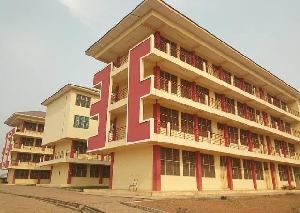A GNA news feature by Pobia
Wa, Nov.1, GNA - Many people in the Wa Municipality are yet to appreciate the usefulness of trees to man's existence and social development.
They do not plant but they destroy to make economic gains to hold brief for themselves and those of their families.
They seem not to care about what tomorrow has for them; all that they want is to make a living today and forget what happens to their children in future.
Coming through major roads leading to Wa, either from the southern, northern, eastern or western part, there is always one common spectacle that meets the eye; a modern type of competitive business transaction of tree leaves between rural women and livestock dealers. It is common to see women carrying heavy loads of leaves tied together and traveling from long distances to Wa to sell to livestock dealers and those who keep few numbers of domestic animals such as goats, sheep and cows in their premises for economic reasons.
Cyclists, Motorists and Pick-up owners have of late found the business lucrative or high-yielding and are on the edge of pushing out the women who hitherto engaged in that business.
The Ghana News Agency has been observing this phenomenon for some time now and on Sunday, which was a Wa market day, decided to find out the effects of this practice on the environment.
As usual, business was at its peak on the roads and when this reporter met with Fuseini Musah, a fodder seller from Kpongo, who was carrying a huge load of leaves on his bicycle and wanted to find out why he was engaged in such business, he has this to say: "I have no job to keep my family and we must live at all cost".
"Is it not better to slash tree leaves and make a living than going to take to arms and rob and kill people to make a living?, Should I go and steal to feed my family, no no.. Don't ask me such foolish questions next time. By the way, are the trees for you, and may I also ask whether you are a stranger in Wa. This business is far older than you and your father", he irritated.
Just as Mr. Musah was struggling to paddle away, five women emerged from the same direction with leaves, each of them struggling to reach to the livestock dealers who were on the road to patronise their goods.
Mothers as they were, they were very polite and humorous in their talk: "Our in-law, it is not easy for us. The five of us you see fend for ourselves. Our husbands are dead and we have been neglected by their family members even though we have children with them".
One can find these leave sellers in every corner of Wa, whether it is a market day or any other day. One would account several numbers of motorists, cyclists and Pick-Up vehicle owners carrying leaves of various species from the Wa Forest for their animals.
All trees that are known to be suitable for animal fodder had had their leaves slashed causing near extinction of valuable trees, some of which have medicinal values.
Mr. Torto Bafo, an Environmentalist, who spoke to the GNA said the practice was in a huge proportion and was likely to cause a desert condition in the communities.
He appealed to government and non-governmental organisations to provide small- scale dams in the communities to help the people to undertake dry season gardening to improve their personal economies and allow the vegetation to renew itself.
Mr. Bafo called on Ghanaians to change their negative attitude towards the environment as the country joins the global fight against climate change.
He said the public should be educated to appreciate the importance of trees, saying: "The existence of man depends largely on the environment, especially trees" pointing out that any negative behaviour towards the environment would affect the future of humankind.
He called on district assemblies and traditional authorities in the communities to enforce laws that protect economic trees, especially the shea and dawadawa, which are now being fell for charcoal production. Mr. Bafo said environmental studies in schools should be taken serious so that students would help educate their parents to change their attitude towards the environment.
Opinions of Tuesday, 3 November 2009
Columnist: GNA














